In This Episode << SLIDE LEFT TO SEE ADDITIONAL SEGMENTS
Anthony Shadid Extended Interview
Read Bob Abernethy’s extended interview with WASHINGTON POST correspondent Anthony Shadid:
Q: You write at one point about the failure of the occupation in Iraq. What happened? What went wrong?
A: I guess at one level I think we never appreciated what Iraq was before we went into the country. I don’t think we ever understood its history, and that’s what struck me as a reporter, as someone trying to understand it myself, trying to make sense of what, when I was writing for the WASHINGTON POST, was — you know, we’d inherited a country that had gone through an eight-year war with Iran, a million dead and wounded on both sides, a decade of sanctions that basically wiped out the middle class, one of the world’s most brutal dictatorships, and the country that we took over was brutalized, was traumatized. It wasn’t going to be a blank slate, a tabula rasa on which to build a new government, and I don’t think that was ever appreciated. I’m not sure it’s even appreciated at this point.
Q: For Shiites and for Sunnis, what difference has religion made and what have the consequences been?
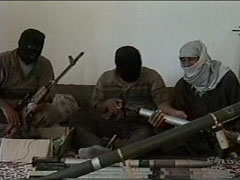 A: When I think back to some of the reporting — there were two stories that I wrote before the invasion. One story was about this run on gun stores, basically people buying weapons before the invasion. The other story I wrote was about the growing numbers of people who were going to mosques, who were embracing religion, this growing religious caste to Iraqi society, and I’m struck, looking back, how those two things that I saw just determined a lot of what’s happened in Iraq since then. Guns obviously. There is a culture of violence; there is a sense of men with guns determining politics in Iraq. I think just as important, perhaps more important is the role that religion plays in Iraqi society. Among Sunni Arabs, I think when we talk about religion in Iraq it’s the way that religion is interpreted, the way it’s tailored to fit the demands of any one place or any one people. Among the insurgents it can become a very militant ideology. It can legitimize any kind of resistance against a perceived enemy. Among Shiites, it’s a political program, in a way. It shapes the political parties, it shapes the protest movements, it creates the justification for their involvement in politics. And I think we’re seeing it almost, you know, each of these cases, it’s almost the exclusive axis on which politics, on which resistance, on which protest revolves, and that’s something new in Iraq, I think.
A: When I think back to some of the reporting — there were two stories that I wrote before the invasion. One story was about this run on gun stores, basically people buying weapons before the invasion. The other story I wrote was about the growing numbers of people who were going to mosques, who were embracing religion, this growing religious caste to Iraqi society, and I’m struck, looking back, how those two things that I saw just determined a lot of what’s happened in Iraq since then. Guns obviously. There is a culture of violence; there is a sense of men with guns determining politics in Iraq. I think just as important, perhaps more important is the role that religion plays in Iraqi society. Among Sunni Arabs, I think when we talk about religion in Iraq it’s the way that religion is interpreted, the way it’s tailored to fit the demands of any one place or any one people. Among the insurgents it can become a very militant ideology. It can legitimize any kind of resistance against a perceived enemy. Among Shiites, it’s a political program, in a way. It shapes the political parties, it shapes the protest movements, it creates the justification for their involvement in politics. And I think we’re seeing it almost, you know, each of these cases, it’s almost the exclusive axis on which politics, on which resistance, on which protest revolves, and that’s something new in Iraq, I think.
Q: And what are the implications of it?
A: I don’t think we’ve seen the implications yet of it. When we talk about the insurgency, I think there’s a worry among many Iraqis — I think there’s growing signs of a hardening of this ideology, of what you might call a religious absolutism that’s being increasingly embraced by more and more people. I think there’s a sense among a lot of people that it’s the foreigners that are the most militant, the most extreme of the insurgents. I’m not sure that’s the case, and in fact I think if all the foreigners were gone tomorrow, killed or arrested, you would still have an insurgency that would be very powerful, probably along the same lines of its intensity today. I think what we are seeing changing, though, is that more and more Iraqis are going over to this kind of religious absolutism. There’s more, it has more influence in their ranks, and I think this is a worrisome sign for a lot of people wondering what is going to become of the insurgency. I think when we talk about Shiite Arabs or we talk about politics in general in Iraq, the political process, it’s the sense that religion is being used to define communities; in a way, it’s hardening the lines between sects and ethnicities, between Shiites, Sunnis, and Kurds, and it’s sometimes hard — it creates a gap that’s hard to bridge. It’s harder and harder to see a voice that’s national, that speaks for all Iraqis. I think you increasingly see voices that only speak, you know, with a religious vocabulary in the name of Shiites, in the name of Sunnis. I think it’s less pronounced under the Kurds, but it’s a similar phenomenon.
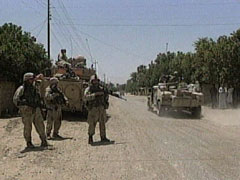 Q: Do they see Americans as enemies, as infidels, as somebody that they just cannot stand and need to have out of there?
Q: Do they see Americans as enemies, as infidels, as somebody that they just cannot stand and need to have out of there?
A: I think there’s definitely kind of a visceral hatred of Americans among some insurgents. Not necessarily all insurgents, but I think, you know, there is that kind of very intense, I guess “hatred” is the word you’d use, among insurgents. I guess what I’m struck by in conversations and in reporting is that it’s not really a hatred as much as a frustration, as a discontent, kind of a disenchantment, you know, I think what we’ve seen since the invasion, since the fall of Saddam is a growing disillusionment and a frustration, I think, that colors so many people’s lives at this point that, you know, there’s still a lot to talk about — freedom and democracy and liberation, these types of things — but the challenge that most Iraqis face day to day is the overwhelming challenge that they have to deal with. It’s suffocating, in a way, and, you know, I think at a certain level politics become an indulgence.
Q: Why couldn’t the American occupation leaders ever get the electricity back on enough and get enough food and deal with these day-to-day problems that are so frustrating for the people?
A: I’ve been there for two years now, and it’s a question I ask myself. You know, when I’m there in the summer and it is 130 degrees outside — we have a generator, where we live, so we’re lucky. But I think it’s a question that Iraqis — you know, electricity is at the cornerstone of modern life, and not having electricity can be overwhelming, especially when you’re dealing with temperatures that are soaring past 100 degrees. I suspect it’s something of a perfect storm. There was a certain incompetence on the part of the occupation. They didn’t appreciate the depth of the deterioration in the infrastructure, insurgents continued to attack it — they know that success in rehabilitating the infrastructure will be a success for the American administration — and then there were other things like growing demand on electricity, these things that all came together that prevented any kind of rehabilitation in a meaningful way for most Iraqis.
Q: That’s the kind of thing that we’re supposed to be good at.
A: Yeah, that’s right, it is, and the thing that I think shaped sentiments probably more than any other single factor was the delivery of these basic social services.
Q: Who are the insurgents, and why can’t we control them?
A: I struggled with that word as a reporter. What is exactly is an insurgent? My best appreciation of it, totally more anecdotal than anything else, is that there are many insurgencies, and it’s impossible to, you know, define them as one current or one ideology or even one approach, one campaign in fighting the Americans. You know, I think there’s a criminal element to it, to be honest. I think it’s relatively small, but there’s a criminal element. I think there is a leftover from Saddam’s government, kind of a Baathist element, a Baathist current that is probably a more traditional guerrilla war that we would have seen in past decades. I think there’s an element that is like what I talked about earlier, kind of a religious absolutist element, the most radical, the most extreme, the current that can justify the carnage, the loss of life of innocents that we see in Baghdad today. And I guess my fear is that — or my sense maybe is a better way to put it — in talking to people and hearing stories, is that current is probably gaining the most traction, is gaining the most force these days.
Q: How do you explain that any religion, or Islam, can be used to justify this random killing?
A: It’s a question that I’m asked often, and I think it’s something that is tougher to understand. My understanding of it is that religion in itself is one message; the interpretation of that religion is another thing, and I’ve seen, just as a reporter in the Middle East over the past decade, that Islam is very pliable in that sense. It’s very flexible and it can be adapted very easily to local movements, local demands, local fights and wars. I think we see it in Palestine, I think we see it in Lebanon, I think we see it, you know, most spectacularly in Iraq. When you see this violence going on today in Iraq, this violence that is, you know, so hard for us to understand, this loss of innocence, scores of people dying, has less to do with religion and more — my sense, at least, is that it’s a very tactical move by the insurgents. They understand that they’re not going to defeat the American military on the battlefield, that it’s impossible. They do think they can defeat the Americans in the realm of perceptions, that they can create this perception of failure. And you create this perception of failure by inflicting more carnage, creating an image of chaos, of anarchy. It’s a spectacle, and you have to keep creating the spectacle, and to keep that spectacle you have to keep killing more people and more people. It’s a grim logic, it’s a brutal logic, but there is a certain logic to it.
Q: And it’s supported by their interpretation of Islam?
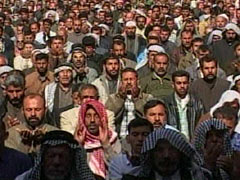 A: I think they use that as the cloak for it; they do sometimes have to struggle to interpret it or to offer an interpretation or justification through a religious lens, and you can see them struggling a little bit because there are injunctions against, for instance, taking one’s life. So how do you justify a suicide bombing, for instance, through religion, and it’s not all that easy sometimes. It’s interpretations that I think most scholars would disagree with pretty strongly.
A: I think they use that as the cloak for it; they do sometimes have to struggle to interpret it or to offer an interpretation or justification through a religious lens, and you can see them struggling a little bit because there are injunctions against, for instance, taking one’s life. So how do you justify a suicide bombing, for instance, through religion, and it’s not all that easy sometimes. It’s interpretations that I think most scholars would disagree with pretty strongly.
Q: We’re coming up to a vote on the constitution. What happens if the constitution is approved, and what happens if it’s not?
A: That, I think, is a fear among a lot of people — that whether it’s approved or whether it’s rejected, you have the same result. Let me see if I can kind of lay this out. You know, I think there’s a sense that it all hinges on the Sunni Arab reaction to this constitution, the Sunni Arabs being the community that’s probably most involved in the insurgency. You know, if the constitution is approved, it’ll probably deepen Sunni Arab resentment and in a way deepen the insurgency; you have them probably feeling even more disenfranchised than they are today. If it’s rejected, if the Sunni Arabs manage to get a two-thirds vote in three provinces, which is necessary to reject the constitution, then you start over from step one. And what we’ve seen so far in drafting the constitution is, again, this hardening of lines between sect and ethnicity, between Shiites, Sunnis, and Kurds, and if the process starts all over again, there’s a sense that those lines will be hardened even more. It’s a bleak prognosis, but you kind of fear that with a rejection or with an approval you might end up with the same outcome.
Q: The same outcome being a confrontation between the men with guns?
A: It’s my sense, just as a reporter there, that there already is a civil war under way in Iraq. We haven’t maybe acknowledged it as such, but when you look at competing agendas, the competing factions, the rivalries between communities and within communities, it already is a civil war. I guess the fear is that you would intensify that civil war. You would turn the country more and more over to this idea of men with guns. It never made a lot of sense to me that you would see Iraq divided among Sunnis, Shiites, and Kurds. It would just be too difficult to draw those borders. But it did make sense to me that you might see a country ruled, you know, very locally by men with guns who impose their own justice, who impose their law, who impose their own control, and that they’re pretty much beyond the reach of the central government of Baghdad.
Q: More and more Americans want the United States to get the troops out. They don’t see what the mission is now and just want to bring them home. What are the reactions to that idea among the people you talk to in Iraq?
A: People talk about it a lot. It is a huge issue of concern: What would happen if the military left? I think you hear two things about a military withdrawal. The one kind of forecast that’s voiced most often is that if the military withdrew, it would lead to more chaos, more instability, more strife, and in a way would deepen what might already be a civil war under way, would intensify that conflict. I think there’s another viewpoint out there, and it’s voiced less often but it is heard, and that’s only with a military withdrawal could you reformulate this political process. In other words, the Sunni Arabs will never join the political process as long as it’s taking place under what they see as an occupation. If you ended that occupation, you might be able to incorporate Sunni Arabs into politics basically and start the process of reconciliation. I don’t see it necessarily likely, but it is set out, it is spoken out there. And it could be something short of withdrawal. It could be a timetable set for withdrawal that would at least introduce a new dynamic into the political process and maybe make some kind of change possible, because I think even U.S. officials, both political and military, in Iraq at this point are — the political process as it is does not seem like it’s heading toward a more stable Iraq at this point, and there is maybe a sense that you need a new dynamic introduced to shake it up.
Q: And that would be a timetable?
A: That’s one scenario offered out there, that even a timetable might induce Sunnis to join the political process in a more forceful way.
Q: Yet it sometimes seems that the hatred of Americans and the deep offense taken at the idea of foreign forces on their soil make it unlikely that we can achieve anything, because our very presence there seems to make it impossible for anything we want to come to be.
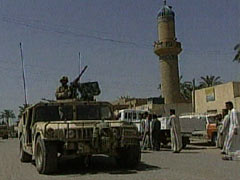 A: I’ve thought about that, especially when it was 2004 and we said that this insurgency was intensifying and that things weren’t going well. We had a sense of it in 2003, but I think we especially felt it in 2004. Was there any other way this could’ve played out differently? Could we have done something differently? Could other policies have been introduced, could the aftermath [have] been handled differently? Part of me thinks there is a certain inevitability to all this, this idea of an occupation, that when [you] have an occupier and an occupied, certain dynamics are set in motion that you can’t deflect. I look back at Iraq over the past couple of years — there’s often a debate about occupation or liberation, which was it? It was a little bit of both, in a way; it was a little bit of neither. More important to me were these forces that we unleashed with Saddam’s fall, this idea of religious revival, of a growing militancy, of a hardening of lines between sect and ethnicity, and these are the forces that I think are beyond our control, in a way. There’s nothing we can do to dent them, and these are the forces at a certain level that are shaping the future Iraq.
A: I’ve thought about that, especially when it was 2004 and we said that this insurgency was intensifying and that things weren’t going well. We had a sense of it in 2003, but I think we especially felt it in 2004. Was there any other way this could’ve played out differently? Could we have done something differently? Could other policies have been introduced, could the aftermath [have] been handled differently? Part of me thinks there is a certain inevitability to all this, this idea of an occupation, that when [you] have an occupier and an occupied, certain dynamics are set in motion that you can’t deflect. I look back at Iraq over the past couple of years — there’s often a debate about occupation or liberation, which was it? It was a little bit of both, in a way; it was a little bit of neither. More important to me were these forces that we unleashed with Saddam’s fall, this idea of religious revival, of a growing militancy, of a hardening of lines between sect and ethnicity, and these are the forces that I think are beyond our control, in a way. There’s nothing we can do to dent them, and these are the forces at a certain level that are shaping the future Iraq.
Q: You write often in your book about unintended consequences. Is that what you mean?
A: Exactly, and unanticipated outcomes. I don’t think we would’ve ever foreseen the power of the clergy, for instance, the Shiite clergy, in politics. The Grand Ayatollah Ali Sistani, the senior cleric, is probably the most powerful figure in Iraq today. I don’t think anybody would’ve forecast that before the invasion. These unanticipated consequences and outcomes are, in a way, the most powerful forces in Iraq today.
Q: It seems so hopeless.
A: Sometimes just as a person, as a reporter there, I feel bleak, but then I think there is a quality that Iraq is really remarkable for, and that’s resilience. I think we’ve seen that resilience time and again; I mean, we talk about this record of what shaped Iraq before the invasion — war and tyranny and sanctions and deprivation. Through all that you still see this resilience, and during the invasion itself. There would be some of the nights with the worst bombing and the next morning the streets would be filled with people and shops would be open, and I think you still see this today, still there’s an ability to get through the next day which is truly remarkable. Their resilience is being tested, there’s no question. Good friends of mine who have been the most optimistic are sometimes very bleak in their comments, but I think it’s still there, I think it’s the best hope for the country as it tries to get past this.
Q: In your judgment, do you think our objectives would be better served if we got out?
A: It’s hard for me to see how the political process as it is now working — I just don’t see how it works unless you have some kind of move toward reconciliation. And I don’t see how you move toward reconciliation without bringing Sunni Arabs in and, again, I think that leads to the idea that I don’t see how you bring Sunni Arabs in without at least a timetable for withdrawal. They seem all very connected to me. That’s the only way I see us going forward, because I don’t see this political process as it is now taking us toward a stable Iraq. Would that work? I don’t know if that would work or not, but it is difficult to see politics as they are or politics as usual at this point in Iraq leading toward something different.
*
Religion associate producer and researcher Janice D’Arcy interviewed WASHINGTON POST correspondent Anthony Shadid, author of NIGHT DRAWS NEAR: IRAQ’S PEOPLE IN THE SHADOW OF AMERICA’S WAR (Henry Holt, 2005) on September 27, 2005 in Washington, DC.
Q: Thanks for talking with us. Let’s start with a description of Iraq’s prewar religious landscape.
A: In terms of religion, before the invasion of 2003 — you saw it especially over the 1990s — there’s a question I have to ask, and I’m not sure what the answer is. There was a religious program that Saddam’s government unleashed, kind of a program to increase the religiosity of Iraqi society, I think, in a way to create new legitimacy for his government, a government that was searching for different forms of legitimacy. But Iraq did become more religious. Was it in response to that program, or was it Saddam reacting to what was already under way in the country? I’m not sure which was the impetus for this, but there’s no question that the Iraqi landscape was becoming much more religious over the 1990s — in terms of mosque attendance, in terms of the symbols of religion, the language of religion, how it was used in government to justify rules.
In some ways what we are seeing now is the consequence of that. Religion is one of the key forms of legitimacy in government today. I think we saw the origins of that 10, 15 years ago.
Q: When Saddam was first toppled, divisions between the Shiites and the Sunnis weren’t immediately apparent — at least the divisions we’re seeing now.
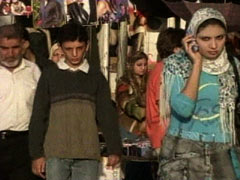 A: Yes, I think that’s true. I think, even today, you probably insult someone if you ask if they’re Sunni or Shiite. It’s not a question you would ask somebody, especially if you first meet them. I think that’s a contrast to Lebanon, say. Lebanon is a similarly complex country where people are very open about their sectarian identification — whether they’re Greek Orthodox, or Maronite Catholic, or a Sunni or Shiite Muslim. It’s not that way in Iraq. I think it’s one of the legacies of the aftermath of the occupation that the lines between sect and ethnicity have hardened to the degree that they have.
A: Yes, I think that’s true. I think, even today, you probably insult someone if you ask if they’re Sunni or Shiite. It’s not a question you would ask somebody, especially if you first meet them. I think that’s a contrast to Lebanon, say. Lebanon is a similarly complex country where people are very open about their sectarian identification — whether they’re Greek Orthodox, or Maronite Catholic, or a Sunni or Shiite Muslim. It’s not that way in Iraq. I think it’s one of the legacies of the aftermath of the occupation that the lines between sect and ethnicity have hardened to the degree that they have.
In a way, I think we had a preconception of the country as Shiites, Sunnis, and Kurds. I don’t think it was only that. It played a huge role in Iraqi politics, but it was not only that. Today, in a lot of ways, it is. That preconception has become a reality. In a way, politics are almost exclusively organized around this communal identification — whether you are Sunni, Shiite, or Kurd.
Q: What was it about the invasion and the subsequent occupation that encouraged that?
A: I think there were a lot of factors that went into it. In this vacuum of authority, new forms of identity emerged. I think, at one level, it was easy to identify yourselves along sectarian or ethnic lines. I don’t think that was the overwhelming force. I think, in a lot of ways, this was a top-down phenomenon. I think the American administration, when it entered Iraq, had this notion of Iraqi politics, and so politics were this kind of identification, a very specific representation of each sect and ethnicity in the government — to a degree that it was never done before. It always cast a shadow before Saddam, but it wasn’t done in such specific fashion before. I think also, probably more importantly, was the role of the exile parties that came into Iraq after Saddam’s fall, that had been working with this notion abroad, these expatriate parties that were organized around sectarian identification or ethnic identification. There were Shiite parties, there were Kurdish parties. I think they brought this notion of confessional politics, of communal politics into Iraq when they came after Saddam’s fall.
Q: What about the relationship with the clergy? The clergy seem to have become more influential at the same time.
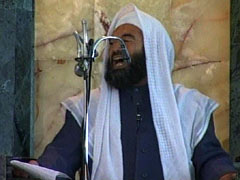 A: I think this is again one of the great legacies of the aftermath of Saddam’s fall and the occupation. There was this vacuum of authority. Other things came to fill that vacuum of authority. On one hand, in Sunni areas, for instance, you had tribal justice reemerging as a way to bring authority. I think in the Shiite areas, especially in southern Iraq but also in Baghdad, you had the Shiite clergy emerging as one of the few institutions that wasn’t devastated under Saddam’s rule. It was devastated, but it was still intact. When Saddam fell, it was able to quickly emerge and fill that vacuum of authority.
A: I think this is again one of the great legacies of the aftermath of Saddam’s fall and the occupation. There was this vacuum of authority. Other things came to fill that vacuum of authority. On one hand, in Sunni areas, for instance, you had tribal justice reemerging as a way to bring authority. I think in the Shiite areas, especially in southern Iraq but also in Baghdad, you had the Shiite clergy emerging as one of the few institutions that wasn’t devastated under Saddam’s rule. It was devastated, but it was still intact. When Saddam fell, it was able to quickly emerge and fill that vacuum of authority.
Q: In your book you have a great description of the difference between Grand Ayatollah Sistani and Shia cleric Moqtada al-Sadr. Can you talk about them and the allegiance to them?
A: They are very different movements, in a way. This is a point I try to make in the book. Sistani and Sadr don’t necessarily disagree on religion. On religious questions, they’re both from the same institution, in a way. They probably share the same beliefs, a very conservative notion of what religion is and what Islamic law should be. They do disagree very clearly, though, on (1) the relationship to the United States, to the occupation, and (2) on the notion of politics, on the notion of activism. I think that’s what we’re seeing today, this difference in politics and this difference in activism. When I was in Najaf a few weeks ago, there was criticism of Grand Ayatollah Sistani for not speaking out on issues that seem so important to the country right now: the insurgency, the American military presence, the constitution, a future government. Sistani is reserved. He’s been quiet. Sadr is the very opposite of that. It’s a protest movement, in a way. It’s a street movement. His Friday prayers are almost like revivalist kind of things, there are 12 to 13 thousand people that will turn up to one prayer meeting in Baghdad’s Sadr City, where his stronghold is. It’s a protest movement. You can see that in the language they use, in their relationship to their followers. The posters that they had at this Friday prayer that I went to a few weeks ago was something like: “In a land of two rivers, there’s no running water. In a land of oil, there’s no gasoline” — very much trying to play social demands, trying to fashion themselves as the representatives of the poor, of the disenfranchised. I think that’s the source of their support these days.
Q: Who is more influential on the street?
A: It’s two different kinds of influence, in a way. Nobody would question Sistani’s authority as a Grand Ayatollah, as probably the senior cleric in Iraq. Nobody is really competing with that. Sadr can’t compete with that. He doesn’t have the academic credentials in the way that Sistani does. But Sistani also couldn’t put a thousand people with guns into the street in Basra, and that’s what Sadr can do. Iraq is becoming increasingly a country that’s dominated by the men with guns — the militias — and that’s where Sadr’s power is often derived. He has a certain popular support. He fashions himself as the representative of the poor and the disenfranchised. He also has a militia, a powerful militia, a militia that has continued to organize beyond the purview of the Americans in southern Iraq. When you travel in the south and you ask people, “Who’s the most powerful?” they’ll say, “Well, Sadr’s the most powerful.” You say, “He’s the most popular?” “No, no, he’s not the most popular, but he can simply take over the city in a matter of days, because he has the men with guns.”
Q: You were one of the first to write about him in the WASHINGTON POST. Have you been surprised about his rise over the last two years?
A: No, I haven’t. I’ve always found him an interesting figure. I didn’t know anything about him when I first met him in Najaf a few weeks after Saddam’s fall. I don’t think any of us appreciated the influence of his father’s ministry. His father was a Grand Ayatollah, like Sistani, a very senior cleric. His father created this grassroots movement in Iraq in the 1990s. But because Iraq was so isolated, it really wasn’t that well known by people outside the country. And so I think a lot of us were taken by surprise at Sadr’s power, at his son’s power after Saddam’s fall. His power derived from the very fact that he was his father’s son. He inherited his father’s movement. His father had been assassinated in the late 1990s by Saddam’s agents. So Sadr inherited this movement and becomes a very powerful figure. In a way, he represents the first popular movement that emerged in Iraq after Saddam’s fall. He still exerts a lot of influence and power. It struck me when I met him soon after the war. He was shy, kind of bashful, in a way. He didn’t have a lot of self-confidence. His Arabic was tentative, in a way. He didn’t have the kind of eloquence that clerics often employ. But it really didn’t matter, because he was his father’s son and he also had a contingent of lieutenants, very powerful advisors and very savvy advisors, young guys that were brash and confident. They kept the movement alive between his father’s death in the late 1990s and Saddam’s fall. In a way, they’re the real power in the movement.
Q: So that is when you first met him. When was the last time?
A: I saw him about a year ago, I think. It’s been a while. He’s been a lot more reclusive since the battles with the U.S. military. He fought the military twice in 2004, so he’s been much more reclusive. He’s been a little more outspoken lately. His lieutenants (the people I just mentioned — these advisors or lieutenants), most of them were in jail after the fights with the U.S. military in 2004. They’ve since been released. I think you see a growing confidence on the part of the movement that it can exert its power, can play a bigger role in Iraqi politics, in Iraqi society in the sense of being a social protest movement.
Q: We don’t hear much about the Christians and other religious minorities. What’s the status of the Christian community in Iraq now?
A: It’s a complicated picture. I think there’s a lot of fear and anxiety among Iraqi Christians. There’s a fear that government is being increasingly identified along religious lines, that the government has kind of an Islamist cast, and that there’s not a place for them. I think you have seen some migration out of the country of people who have means to do so. I don’t want to overstate this. I want to be very careful how I say this, but I think among some Christians there is maybe a sense that Saddam was a brake against Islamist ambitions in the country and that there is not necessarily a brake on those ambitions anymore. In a country that increasingly has an Islamist cast to it, there’s not a place for them, necessarily. So I think you’re seeing a sense of marginalization, a fear of what’s ahead, that maybe the community itself should probably stay reclusive, that they shouldn’t play too big a role, not expose itself. At the same time, there is political organizing going on. There are Christian parties. There is representation in government and the ministries, but I’m talking about the broader community itself.
Q: That leads us right into the constitutional debates. Why is it that the Shiite leadership does not want to put an overt reference to religious freedom in the constitution? They want to acknowledge Sharia. Why is that so important to them?
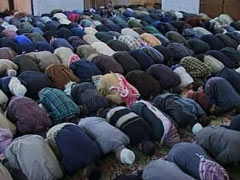 A: I think sometimes we underestimate how Islamist the Shiite parties are, especially the Shiite parties that are allied with the United States and are having a huge say in deciding the constitution. They are Islamist parties, very much so. One of the main pillars of a platform like the Supreme Council or other Islamist parties is this idea of Islamic law, this idea of the preeminence of religion, of Islam being, at the very minimum, a major source of legislation, often the source of legislation. There is resistance to that notion, I think, among both Sunnis and Kurds, who fear that the Shiite clergy themselves will have a role as a final arbiter on specific laws, specific legislation, specific policies. There is a reservation there about the role of the clerical establishment in Iraqi politics.
A: I think sometimes we underestimate how Islamist the Shiite parties are, especially the Shiite parties that are allied with the United States and are having a huge say in deciding the constitution. They are Islamist parties, very much so. One of the main pillars of a platform like the Supreme Council or other Islamist parties is this idea of Islamic law, this idea of the preeminence of religion, of Islam being, at the very minimum, a major source of legislation, often the source of legislation. There is resistance to that notion, I think, among both Sunnis and Kurds, who fear that the Shiite clergy themselves will have a role as a final arbiter on specific laws, specific legislation, specific policies. There is a reservation there about the role of the clerical establishment in Iraqi politics.
Q: With a Shiite majority, is it possible that those other groups that are concerned about it will have any sway?
A: With the Shiite majority, it’s kind of difficult. I was often struck, when I was covering the election and I’d ask questions about, “Will you vote for Alawi, who’s more of a secular candidate, or will you vote for the people that are perceived as being backed by Sistani?” People would often say they like Alawi very much, but they can’t go against what is known as the mujahi, which is Sistani basically, the supreme religious authority. So I think people are often torn by this. It’s amazing to me how much power Sistani’s office still holds or still wields in Iraqi politics. You don’t have a similar organizing around religious principles among Sunnis or Kurds. Politics are defined, I think, in different terms. The Kurds are very invested in the project. The Kurds are looking forward to consolidating their control over the Kurdish regions in the north. It’s less a battle over Baghdad and the future of Iraq and more about consolidating their control in the north. The Sunnis are still disenfranchised, in a way. They are not willing to fully participate in the political process as long as there’s the notion of occupation. So you have all these kinds of checks. You have checks against exerting their power and influence. I think it’s easier for parties like the Supreme Council to further an agenda that might not be accepted by the overwhelming majority.
Q: How is it being perceived by Iraqis that the American leadership has tried to pressure them to change the constitution, to include what we would consider democratic ideals?
A: The constitution is an interesting debate. Again, it’s kind of priorities of what’s going on in people’s lives that I think determines how they perceive the constitution. What I mean by that is that I think there is a sense that often — with the election in January and I think with the constitution as well — there’s a sense that both of these things are means to an end rather than the end in themselves. In other words, with the election, with the constitution, we’re going to create a more stable country. With a more stable country, basic services will be delivered; there will be a notion of security, of safety, getting on with more normal lives, ordinary lives. These are the ways towards that goal. I never really saw the election choosing a specific candidate, or a specific party or platform. It was just an instrument. I think there is a sense of that with the constitution as well. That’s at one level: Is the constitution going to bring us a more stable country? At another level, I think the Americans may — I think you’ve already heard this among Sunni Arabs in particular, that the Americans were too involved in the drafting of the constitution, that this is an American constitution. You often hear that criticism among the Sunnis. Among Shiites, Shiite parties in particular, I think there is a sense that this constitution is a way for them to consolidate what’s already the reality: that they are the majority and the majority should rule. The American involvement in this is complicated. They probably couldn’t have gotten this far without American intervention, but this level of intervention is probably going to forever taint the legitimacy of the constitution, especially among Sunnis. So it will be interesting to see how that plays out. I don’t know what it will do.
Q: What are your expectations for what happens October 15th?
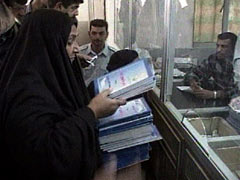 A: I think even the embassy there would acknowledge — American officials would acknowledge — that without Sunni Arab participation in the constitution, the constitution is not going to go through. The constitution probably won’t represent a step towards reconciliation, which is what everybody wants, a stable Iraq. As the political process is unfolding, you don’t see that dynamic where it really changes anything. It just seems to be more of the same. You look toward the constitution. If the constitution is somehow rejected by Sunni Arabs — which they can do; there’s a certain instrument that allows them to do it, a majority in a certain number of provinces — if the Sunnis do reject the constitution, we start over at the beginning, which is a very prolonged interim period. If they don’t reject it, it deepens Sunni resentment and deepens the insurgency probably at a certain a level. So it’s hard to see how the constitution itself, as this path is set out, does anything but keeps us on the same path we’re already on.
A: I think even the embassy there would acknowledge — American officials would acknowledge — that without Sunni Arab participation in the constitution, the constitution is not going to go through. The constitution probably won’t represent a step towards reconciliation, which is what everybody wants, a stable Iraq. As the political process is unfolding, you don’t see that dynamic where it really changes anything. It just seems to be more of the same. You look toward the constitution. If the constitution is somehow rejected by Sunni Arabs — which they can do; there’s a certain instrument that allows them to do it, a majority in a certain number of provinces — if the Sunnis do reject the constitution, we start over at the beginning, which is a very prolonged interim period. If they don’t reject it, it deepens Sunni resentment and deepens the insurgency probably at a certain a level. So it’s hard to see how the constitution itself, as this path is set out, does anything but keeps us on the same path we’re already on.
Q: Do you see any possibility that, in the next few weeks, there can be a rapprochement between the Shiites and the Sunnis, or even in the next few months?
A: I don’t. I think you have to understand the dynamic in the political process. I don’t see how you do that without something changing in a serious way. Sunnis aren’t all of a sudden going to join the political process unless they’re somehow brought into it. I don’t see how you bring them into it as long as there’s an American military presence that they view as an occupation. As long as the occupation exists, I don’t see how they join the process.
Q: So what are your expectations beyond the constitutional vote, for the next few years?
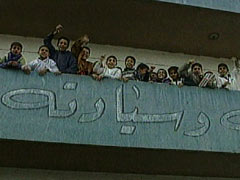 A: I don’t know. That’s a good question. My predictions are usually wrong, to be honest. Could we have a relatively stable country in 10 or 15 years? It’s possible. Could we have a full-fledged civil war? I think that’s possible, too. I guess probably we’re going to be writing about the same things in five years that we’re writing about today. There might be a deterioration of the country. We were talking earlier about men with guns running parts of the country; not necessary Sunni against Shiite, but maybe rival militias within the Shiite community, rival factions within the Sunni community, each staking out their own turf, trying to exert their own form of control. You can have a relatively stable government in Baghdad, with a legislature and embassies and ministries, but once you get into the hinterland, it’s less and less control.
A: I don’t know. That’s a good question. My predictions are usually wrong, to be honest. Could we have a relatively stable country in 10 or 15 years? It’s possible. Could we have a full-fledged civil war? I think that’s possible, too. I guess probably we’re going to be writing about the same things in five years that we’re writing about today. There might be a deterioration of the country. We were talking earlier about men with guns running parts of the country; not necessary Sunni against Shiite, but maybe rival militias within the Shiite community, rival factions within the Sunni community, each staking out their own turf, trying to exert their own form of control. You can have a relatively stable government in Baghdad, with a legislature and embassies and ministries, but once you get into the hinterland, it’s less and less control.
Q: That’s sobering. When did you last leave Iraq?
A: A few weeks ago, the end of August.
Q: How long have you spent there?
A: I went there in 1998 as a reporter for the Associated Press; in 2002 with the BOSTON GLOBE; then in March 2003 with the WASHINGTON POST, before the invasion, and then I stayed throughout, except for six months to write the book in 2004.
Q: In terms of personal safety, are you feeling most endangered now?
A: Yes, in some ways. I think the threat of kidnapping may have receded a little bit since last year. I think it was worse last year. But I think the threat of being caught in violence — I think the level of violence itself is much more intense. So that’s a greater danger. I was in Basra a few weeks ago. In Basra, I often felt very safe reporting there. I’d sit in cafés in the open. Lately, it’s become very dangerous. These militias, these men with guns that I’ve been talking about and their security forces, there’s not a lot of accountability.
Q. Especially for journalists, yes?
A. Especially. I think two journalists have been killed there in the past few months. You look at a policeman in Basra and you don’t know if he’s there to protect you or to do something else. That’s the most scared I’ve been as a reporter. I don’t think I’d go back there.
Q: You wouldn’t go back to Basra?
A: No, not at this point.
Q: Could that become a model for other cities?
A: You wonder. I think there is a move by the Supreme Council, the Shiite party, to take control of security forces. I think the Pesh Murga, the Kurdish militia, are doing the same in the north. Where this all leads, I don’t know, but the security forces are not professional, independent units at this point. They’re units with an agenda, with loyalties elsewhere.
Q: You are an Arab American, grew up in Oklahoma, your family is from Lebanon originally.
A: My grandparents emigrated from Lebanon.
Q: Did you learn Arabic at home?
A: I didn’t, no; a little bit, just a few words here and there. I studied Arabic in college and then in Cairo for a year and then lived in Egypt for four and a half years.
Q: This book is filled with voices we haven’t heard from too often in the American media — Iraqi voices. How have you been able to pierce that wall that so many journalists haven’t been able to?
A: I don’t know. I never really looked at other reporters, so I don’t know how they operate. I guess the route I always try to do is just to listen. I try not to lecture people, try not to tell people what they should think or what they should do. Just hear them out. My favorite interviews last five or six hours. It’s all about building up trust. That’s what I tried to do in Baghdad. Sometimes it worked, sometimes it didn’t. I think about the relationships that I built with the people that are in the book. Those are relationships that I built over a year, sometimes two years, and I’m still in touch with [them]. After that kind of perspective on them and the things they’re going through, you build a deeper and more intimate portrait of the country.
Q: What is your own religion?
A: My family is Orthodox Christian.
Q: How did you come to be the Islamic affairs reporter for the [WASHINGTON] POST? How did you learn about the Islamic faith?
A: It was interesting. As a reporter with the AP in Cairo in 1995, I thought the Israeli-Palestinian conflict shaped almost everything in the Middle East. What I soon realized was that that wasn’t the case. It does; it has a huge role in the region’s politics. But I was struck by how big a force political Islam had become in shaping movements, in shaping political language, in shaping authority. In ’95 and ’96, I did a series of articles for the AP that later became a book about Islamic democracy. As a reporter trying to understand the region, you have to try to understand the forces that are shaping the region. I think it is conflicts like the Israeli-Palestinian conflict. I think it is Islam, especially political Islam. I think more and more, even today it’s become this question of identity and who we are in countries like Syria and Lebanon and Iraq and Saudi Arabia. The thing that struck me most recently is that question of identity. Once you answer that question of identity, then you start answering the question of what kind of political systems are put in place.
Q: What is your definition of “political Islam”?
A: The use of Islam as a political program. It’s kind of a vague thing: The use of imagery, of symbols, of the law itself to tailor a political movement to a political program. The very direct intersection between faith and politics. I think we’re seeing more and more of that. Movements like Arab nationalism, for instance, or more local nationalism — Egyptian nationalism, Syrian nationalism — they’re much less resonant than a religious message that’s tailored toward politics, which I think we see as having the greatest influence and greatest power in countries like Egypt, Syria, Iraq, the Gulf, every Arab country you cover these days.
Q: What do you think of the conversation we’re having here in the United States about whether Islam is or is not a religion of peace?
A: I guess it’s not the question I would ask. To me, it’s immaterial, in a way. It depends on how somebody defines and interprets it. It depends on what kind of religion it is. To me, the bigger question is: Can political Islam, or the interpretations of political Islam you see in certain countries, coexist with democracy? An even more direct question: Can democracy exist without it? In other words, do you have to bring Islamists into the political process if you’re going to have a viable political process? It’s a question that hasn’t been answered yet. I think the administration, the U.S. government, is very reluctant to see Islamists join the political process. They fear that once they join it they’ll hijack it. But then how do you represent a quarter or a third of the population of countries like Egypt, who identify themselves with these movements? How can you have a democracy without those people being represented? I don’t know the answer to that.

